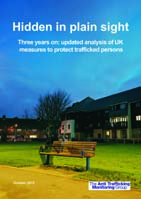31 October 2013
UK Anti-trafficking response fails victims of trafficking says report by Anti-Trafficking Monitoring Group.
Hidden in Plain Sight full report (766.75KB)
Hidden in Plain Sight executive summary (1184.36KB)
Failures of the UK’s system to identify, protect and assist victims of trafficking has been highlighted by the new report by Anti-Trafficking Monitoring Group. The report describes how the focus on the immigration status of the potential victims of trafficking discriminates people from outside the EU.
The report highlights the need to include the victim protection into the new Anti-Slavery Bill, announced by the Home Secretary Theresa May.
Report entitled ‘Hidden in Plain Sight’ has analysed the UK’s response to trafficking four years on from the Council Of Europe anti-trafficking convention coming into force. Whilst there has been a number of improvement in the government’s response to trafficking through the National Referral Mechanism (NRM), the system fails to systematically identify, assist and protect victims of trafficking.
The major problem of the UK’s system is looking at victims of trafficking through context of their immigration status, causing the decision making to be unfair and discriminatory. Whilst over 80% of EU/ EEA national referred to the system in 2012 received positive decisions identifying them as victims of trafficking, less that 20% of those from outside of European Union received positive identification.
From the analysed 40 NRM rejection letters issued by the Home Office (dealing with referrals of people from outside of the EU), ATMG found reasons to doubt the findings in 36, i.e. 90% of the letters. In particular the Home Office showed it sometimes misunderstood the definition of trafficking, as well as the effects of trafficking on the victim. It focused on small inconsistencies in the victim’s account to question the credibility of the whole account; or rejected claims because of a lack of corroborative police evidence.
In some cases the HO rejected claims on the basis of trafficking being ‘historic’, the unlawfulness of the practice confirmed recently by the recent judgment.
There are cases reported of Home Office first responders failing to identify victims of trafficking and detaining them in Detained Fast Track.
There have been increasing delays in determining decisions by the Home Office. At the same time negative decisions are taken without consulting interested parties and little information is sought from service providers to assist in decision making.
In cases where trafficking victims apply for asylum, the Home Office is often combining the procedures, leading to the denial of trafficked persons’ rights to reflection delay and assistance and contributing to poor NRM decision-making.
The failings of the referral system are underlined by the fact there is still no formal appeal procedure for negative NRM decisions.
The report noticed a number of positive prevention and awareness raising activities conducted especially in the run up to the London Olympics, as well as the Home Office’s release of funds for NGOs to train and raise awareness of various professional groups. However, in 2013 there are still no minimum standards on safe return and the re-trafficking of victims.
A landmark judgement in May 2013 at the Court of Criminal Appeal confirmed the importance of the non-criminalisation of victims of trafficking in situations of forced criminality. In spite of this there are reports of increasing numbers of victims of trafficking identified in prisons.
The report comes at the time when a new single anti-slavery bill, announced earlier this year by the Home Secretary, is being prepared. The government announced the bill will get tough on traffickers introducing a maximum life sentence, consolidating into a single act the offences used to prosecute traffickers and introducing trafficking prevention orders. It also committed to create the post of an anti-slavery commissioner.
Whilst these are positive steps, the initial announcements failed to introduce the protection of victims into the bill. The report shows that in order to tackle trafficking and successfully prosecute traffickers a victim protection system needs to be in place to gain trust of trafficking victims for them to co-operate with the criminal justice system.
Klara Skrivankova, Anti-Slavery International’s Trafficking Programme Co-ordinator said: ‘Unless a comprehensive anti-slavery bill is introduced that puts assistance to trafficked persons on a statutory footing, the value of such law will be minimal. Internationally, it has long been recognised that an effective anti-trafficking instrument must contain provisions for victim protection in addition of criminal offences of trafficking.’
Note to editors
For more media information or to arrange interviews, contact:
Jakub Sobik, Anti-Slavery International Press Officer at j.sobik@antislavery.org or on 07912 145610.
To learn more about Anti-Trafficking Monitoring Group please go to www.antislavery.org/atmg
